Politics
The APC Lacks Credibility To Discuss Debt Management In Delta State
Published
8 months agoon
By
Ekwutos Blog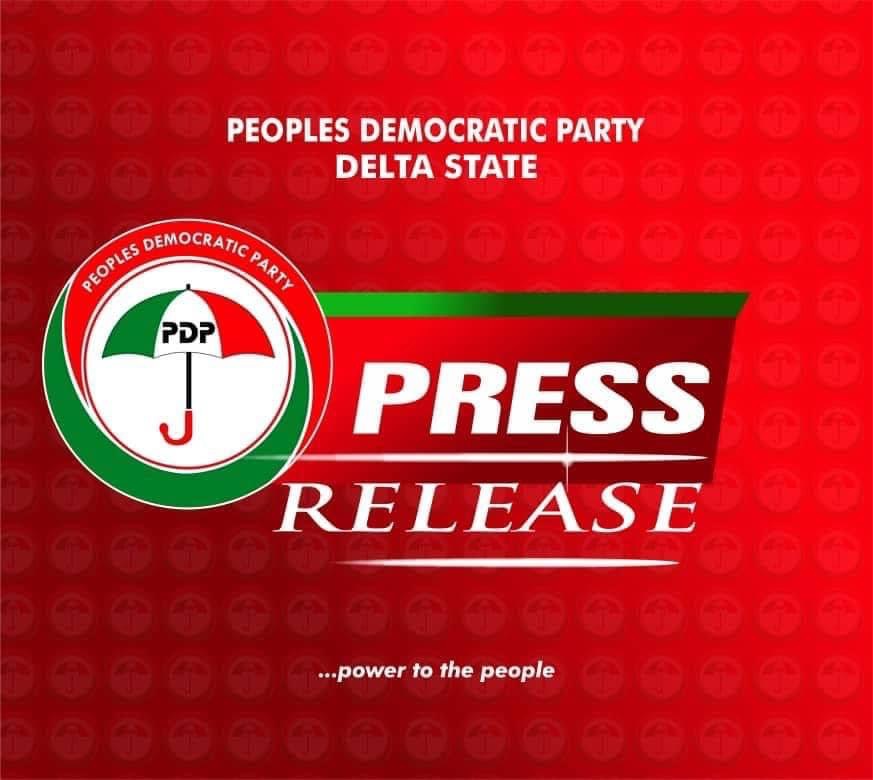
The recent misguided propaganda by the Delta State Chapter of the All Progressives Congress (APC) to misinform the public on the debt management measures being undertaken by the administration of His Excellency, Governor Sheriff Oborevwori, was, at best, a shameless act of its characteristic duplicitousness.
In the release signed by its Publicity Secretary, Valentine Onojeguo, the APC merely tried to disinform the public by attempting to play down the significance of Governor Oborevwori’s act of responsibility in reducing the debt profile of the State to ensure greater financial stability and sounder economic health.
It is indeed strange that the APC in Delta State would pretend not to know the origin and the truth about the debt profile of the nation and the States. Let us remind them that through the mismanagement of the national economy by the APC-led Federal Government, from 2015 when it took over the reins of government with President Muhammadu Buhari, it has presided over heavy and reckless borrowing, escalating the national debt stock from about N7 trillion after the 16 years of the PDP governance, to over N90 trillion under its eight years, leading to a situation in which 97% of Nigeria’s national revenue was devoted to debt servicing and the attendant reduced revenue allocations to States and Local Governments.
While it failed woefully in managing the crude oil production capacity of the nation which it brought from over two million barrels per day to a low of about one million BPD, a huge chunk of the revenue receipts from even the low output had been devoted to their corruptive importation of petroleum products and payment of fuel subsidy, by which little or nothing was being returned to the federation account.
The situation was further worsened by its poor fiscal and monetary policies which steadily and increasingly devalued the Naira and posed inflationary difficulties across all sectors and segments of the nation.
The former Minister of Finance under Buhari, Zainab Ahmed, openly admitted in 2021 that, revenues were low and so were federal allocations to the States and Local Governments.
“The crash of the crude oil prices really hit us very hard in terms of revenue. We have very low revenues, we have very high expenditures. What we have done so far is just to provide some stability to make sure salaries are paid, pensions are received every month; that we send funds to the judiciary and the legislature; that we meet our debt service obligations. That’s what we are doing. It also means we have had to borrow more than we have planned.
“It is a very difficult time. I cannot explain to you how difficult it is, not just for the Federal Government but also for the States. We see increasing reductions in our FAAC revenues. So, FAAC reduces and whenever FAAC reduces, it is a very difficult situation.”
Those were the words of the former Minister of Finance of the APC government on the national economy.
Not only did the federal government try to sustain the economy purely on loans and more loans which were not applied to productive sectors nor effectively and equitably to infrastructural development, it also resorted to printing money which is the worst style of economic management.
During a Senate Committee hearing in March 2024, the current Minister of Finance and Coordinating Minister of the Economy, Wale Edun, gave a sordid picture of how the APC mismanaged the national economy, from 2015 to 2023.
“It came from eight years of just printing money not matched by productivity. It’s not like when you earn dollars, and you free the naira alongside it. We are going to audit even the N22.7 trillion printed aimlessly. The consequence of the eight years of printing money without productivity is high inflation confronting the country now,” he said.
Given this background of APC management of the economy from 2015 to 2023, as we have seen attested to by its Ministers of Finance, it can only be shameless pretence, though in line with its usual deceitfulness, for the APC to question why component States of the federation had to source market funds, including loans and bonds, to be able to function effectively in the service of their people.
According to the National Bureau of Statistics, Lagos, an APC State, led in the borrowing with close to N1 trillion.
“Lagos State recorded the highest domestic debt in Q2 2023 with N996.44 billion (and) recorded the highest external debt with US$ 1.26 billion, followed by Kaduna with US$569.38 million.”
Delta State, like all other States could not have been an exception in seeking ways and means to serve its people. With a total exposure of about N450 billion accumulated through the years into the first quarter of 2023, as forced mostly by consequence of APC mismanagement of the national economy, Delta State holds neither the highest domestic nor external debt, and the immediate past administration of His Excellency, Senator Dr. Ifeanyi Okowa, clearly outlined the infrastructure projects on which borrowed funds were applied, as are visible across the State.
However, in the current dispensation, even when the APC federal government and some other States have continued to borrow, Governor Sheriff Oborevwori has decided not only to hem borrowing but also to pay up and reduce inherited loans and interests in order to safeguard the State from the kind of debt service burden that has crippled the nation under the leadership of the APC.
Such commitment is not only noble, but can only be executed through a deep sense of leadership responsibility and financial prudence as Oborevwori is demonstrating.
In his 2024 budget appropriation, he was emphatic about keeping the State expenditure within revenue limits, reducing its debt profile and ensuring that the administration does not build new inflationary pressure through extra budgetary funding. In simple terms, his government is averse to borrowing, profligacy and expenditures that are not planned nor budgeted for.
It was for this reason that he cut down on various items relating to executive cost of running government while he increased the budget volume for projects and programmes directly related to providing for the people, communities and workers.
This was demonstrated in the reduction of Overhead Cost by N9.7 billion or 8.35%, from N116.2 billion in 2023 to N106.5 billion in 2024; the reduction of the vote for Grants and Contributions by N4.7 billion or 32%, from N14.7 billion in 2023 to N10 billion in 2024; the reduction of the capital vote for the Administration sector by N20.9 billion or 48%, from N43.6 billion in 2023 to N22.7 billion in 2024; and the drastic reduction of Contingency provision by N8.2 billion or 61.7%, from N13.3 billion in 2023 to just N5.1 billion in 2024.
While the budget made a provision of N50 billion for possible receipts from loans, it is on record that the administration has not borrowed a dime in its almost fifteen months, notwithstanding the financial requirements for the execution of high level infrastructure projects, workers and social welfare investments, and human capital development programmes being churned out across the State.
Rather, Oborevwori has saved over N205 billion through financial efficiency and gone on to reduce the State debt profile by N180 billion.
It is these achievements in the financial management of the State that the APC is quarreling with.
But see why we will not bother about their charade: They want the State to be run the way APC has misrun the national economy since 2015, in which through their reckless borrowings they led Nigeria into servicing its debts hanging with over 97% of its national revenue, and borrowing evermore in the attempt to sustain the economy on borrowed life wire, while actually crashing it. God forbid that to happen in Delta.
On the contrary, Oborevwori is determined to manage Delta into a debt-free State.
Thankfully, from the relative increase in oil production output, especially in Delta as occasioned by Oborevwori’s efficient management of relations with oil producing communities, there is increased allocation to the State and he is focused on managing the State economy within its means, including intensified IGR, to administer the State in such manner that debts would not be left for coming generations and administrations to inherit as the APC does and would want to see in Delta State.
Signed:
Engr. Dan Ossai, MNSE, CEng.
State Secretary,
PDP, Delta State
12th August, 2024
You may like


25 YEAR OLD FASHION DESIGNER ALLEGEDLY POISONED BY HIS GIRLFRIEND AT MARINE BASE, PORT HARCOURT


Chelsea ‘breach UEFA limits on financial losses’, could be banned from Europe


Federal High Court in Abuja has set April 10 as the date to hear a case asking for the removal of Vice Admiral Ibok-Ete Ekwe Ibas as Sole Administrator of Rivers State.


NATIONAL POLICE DAY: PREPARATIONS REACH CLIMAX; POLICE ENGAGE IN NATIONWIDE WALKATHON As IGP calls for inclusive policing in Nigeria.
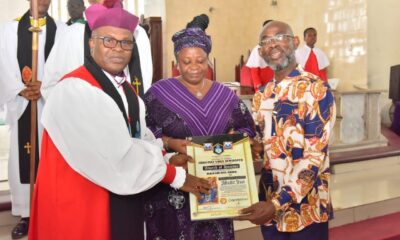

Uzodimma congratulates Christian Voice Newspaper on 25th Anniversary …As his Commissioner, Chief Press Secretary, others bag distinguished media personality award
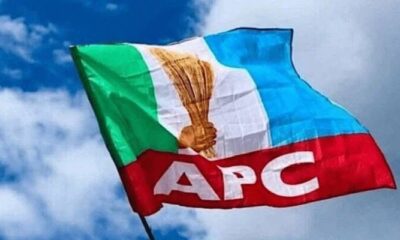

Violence, Police Collusion As Alleged Ukachukwu’s Thugs Block APC Accreditation In Awka.
Politics
Violence, Police Collusion As Alleged Ukachukwu’s Thugs Block APC Accreditation In Awka.
Published
3 hours agoon
April 5, 2025By
Ekwutos Blog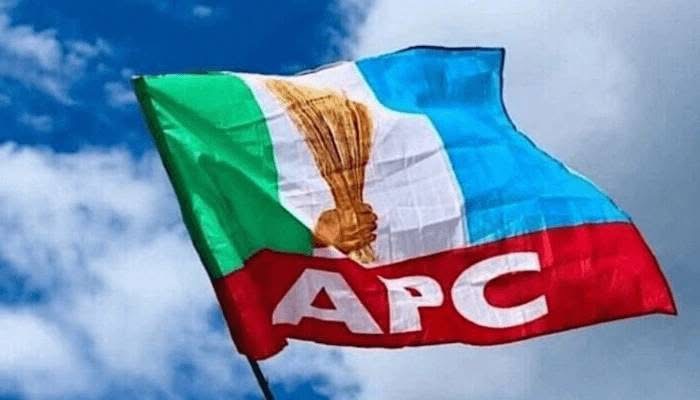
The All Progressives Congress (APC) governorship primary in Anambra State descended into chaos on Saturday morning, as thugs allegedly loyal to aspirant Nicholas Ukachukwu, in concert with police officers, violently disrupted the delegate accreditation process at the Beautiful Gate Hotel, Awka.
hotel gate had reportedly been taken over by suspected Ukachukwu’s private security operatives and suspected thugs, who, with apparent support from police personnel on the ground, began preventing accredited delegates without Ukachukwu’s campaign identification from accessing the venue.
Politics
Soludo clinches APGA ticket unopposed for Anambra guber
Published
4 hours agoon
April 5, 2025By
Ekwutos Blog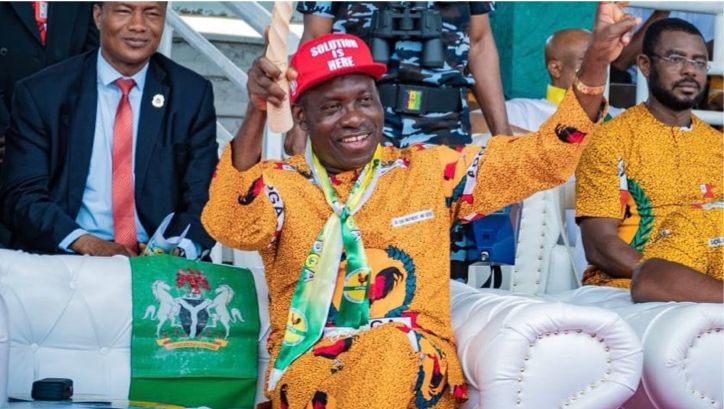
Chukwuma Soludo, the governor of Anambra state, has been officially nominated as the All Progressives Grand Alliance (APGA) candidate for the upcoming governorship election.
Soludo, who was returned unopposed, secured over 3,000 votes in the primary held on Saturday at the Ekwueme square, Awka.
Voting took place across the 21 local government areas of the state, where delegates were asked to cast a simple “yes” or “no” vote.
“Total delegates for this election is 3,260; 3,175 were accredited; 3,172 total votes cast, with four invalid votes,” Uche Nwegbo, chairman of the electoral panel, said.
“The governor received 3,168 yes-votes and no no-votes. By the powers conferred on me, I hereby declare Prof. Chukwuma Soludo as the candidate of our party.”
Soludo accepted the nomination and assured party members of continued development in the state.
“I want to say that I am humbled by this historic display of solidarity to be able to raise the flag of our party again, and I want to say that I accept this nomination wholeheartedly,” he said.
“Anambra keeps rising with the progressive leadership that we have had through APGA, and I will continue to appreciate the leadership of the party.
“I appreciate the members of our party and the INEC observers. I do not think that we have ever had this kind of peaceful election where everything was orderly and in one hour everyone was able to cast their votes.
“In 2021, Anambra interviewed all the candidates and employed me, and all through the journey, three years down the line, you have been able to give us support. That is why we have been able to do what we do, which people say is magical. We are doing this without borrowing one Naira, and I know we will continue to do even more, and we continue to ask for your prayers.
“We are only at the introductory stage; Anambra has not seen anything yet. I appreciate the citizens and captains of industries who have been supporting us, and we will keep growing higher and higher.
“I appreciate the support groups, especially all that endorsed us for a second term. They are still coming up with more donations to the campaigns, and I thank those market women who are still eager to donate to our campaign. Many political parties have declared support for us, and never in Anambra State have we ever had a consensus like what we have today.
“When I took oath of office, I promised not to let Anambra down, not to let my supporters down, not to let my family down, and not to let APGA down. We are working 247 to ensure that. Many people have said we do not have any opposition, but I say that we will not only win all 21 local governments but also the 326 wards. Someone said we should even aim for all the polling units in the state. We want to make a statement.”
Soludo said would retain Onyeka Ibezim, the deputy governor, as his running mate for the November 8 election.
“In 2017, I gave a lecture which I titled ‘If it is not broken, why mend it’, and it became popular. Today, I want to say that I am renominating Dr Onyeka Ibezim as my deputy governorship candidate for the election. If it is not broken, why mend it? I want to say that the battle has only begun,” he added.
Politics
BREAKING NEWS: Chief George Muoghalu emerges the flag bearer of the Labour party.
Published
4 hours agoon
April 5, 2025By
Ekwutos Blog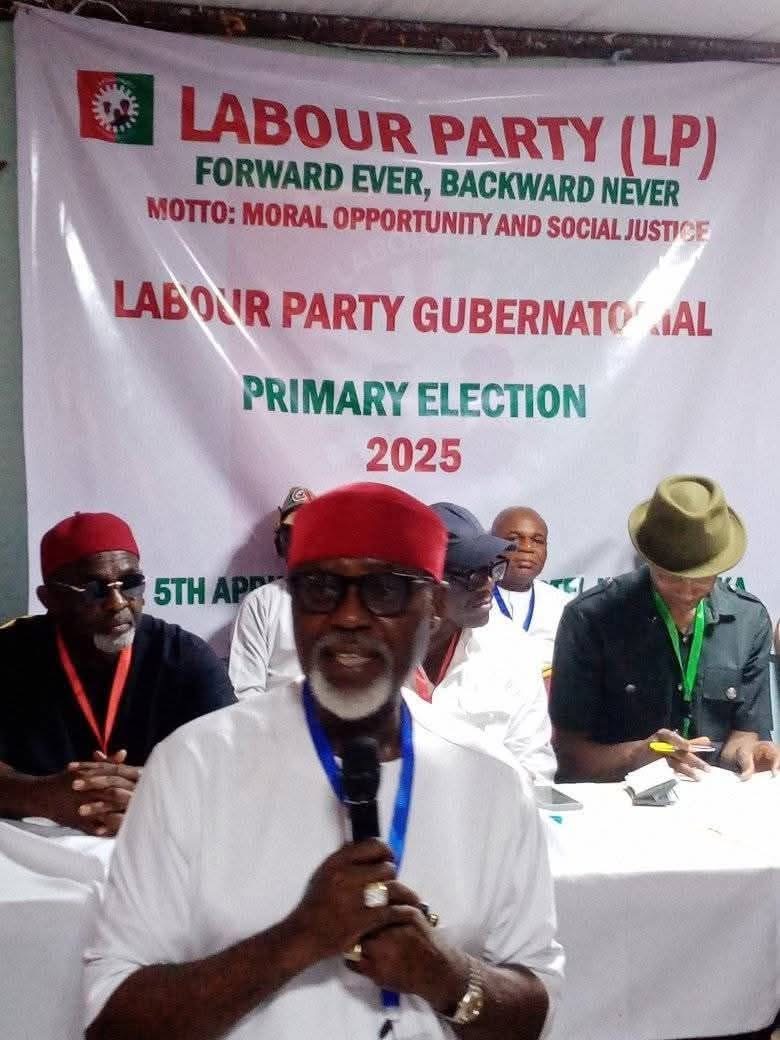
Chief Muoghalu is expected to slug it out with Prof. Charles Chukwuma Soludo popularly known as Solution master who had earlier been declared the flagbearer for the All Progressives Grand Alliance for November 8, 2025 Anambra State gubernatorial election.
we await the outcome of the All Progressives Congress’ primary election results.

25 YEAR OLD FASHION DESIGNER ALLEGEDLY POISONED BY HIS GIRLFRIEND AT MARINE BASE, PORT HARCOURT

Chelsea ‘breach UEFA limits on financial losses’, could be banned from Europe

Federal High Court in Abuja has set April 10 as the date to hear a case asking for the removal of Vice Admiral Ibok-Ete Ekwe Ibas as Sole Administrator of Rivers State.
Trending

 Trending6 months ago
Trending6 months agoNYA demands release of ‘abducted’ Imo chairman, preaches good governance
- Business6 months ago
US court acquits Air Peace boss, slams Mayfield $4000 fine

 Politics6 months ago
Politics6 months agoMexico’s new president causes concern just weeks before the US elections
- Entertainment6 months ago
Bobrisky transferred from Immigration to FCID, spends night behind bars
- Entertainment5 months ago
Bobrisky falls ill in police custody, rushed to hospital

 Politics5 months ago
Politics5 months agoRussia bans imports of agro-products from Kazakhstan after refusal to join BRICS

 Politics5 months ago
Politics5 months agoPutin invites 20 world leaders
- Politics1 year ago
Nigerian Senate passes Bill seeking the establishment of the South East Development Commission.

